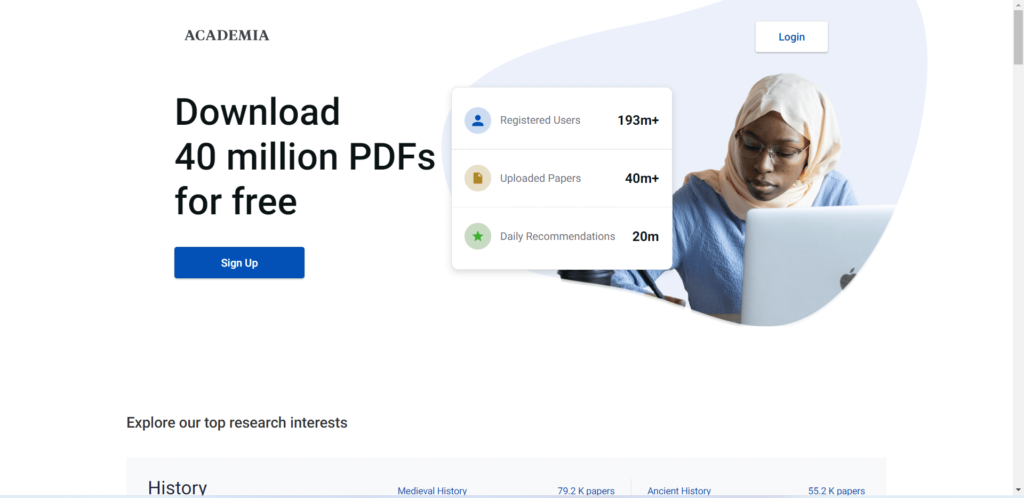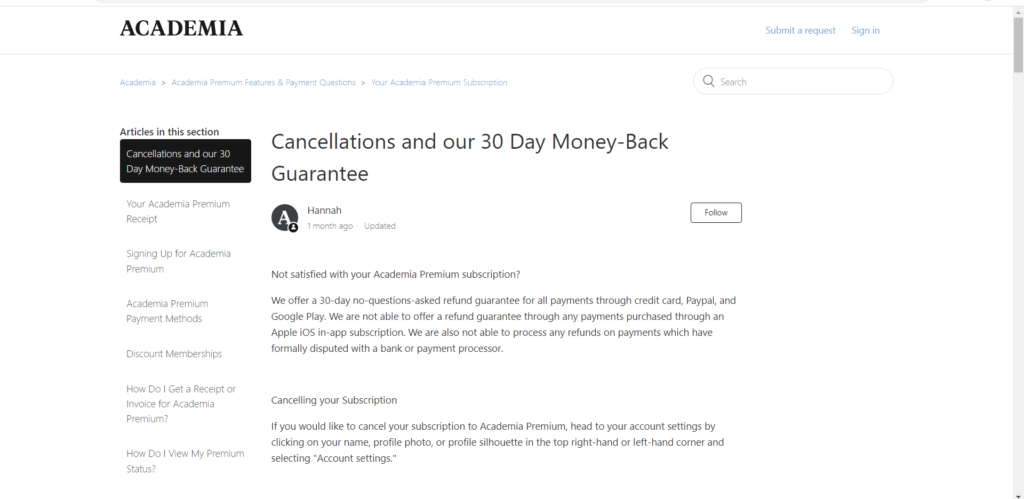Summary: As its name implies, Academia is a fast-growing website for sharing academic research, with over 40 million papers available on the site and over 194 million registered users. Despite promising free access to research papers and scholarly journals, many research materials available on the site will only let you view the first page of the paper; the site heavily encourages you to subscribe to membership to access the entire document. Some customers have also been unknowingly charged, calling the website a scam.
Academia.edu is a for-profit social networking website aimed at academics. They offer free access to academic papers, journals, and articles, promoting free research and knowledge. The company’s goal is to make scholarly research available for free online, and the site records an average of 113 million visits per month.
However, is Academia.edu all it’s cracked up to be? If you are willing to pay the subscription for a premium account, it is worth it. Yet this may be an unnecessary cost, with many other services, such as Google Scholar, offering a similar service for free. Academia.edu seems to promise a lot for customers using the free accounts but doesn’t deliver, constantly attempting to charge customers and preventing access to information without payment.

Table of Contents
- Academia.edu Company Information
- What is Academia.edu?
- Is Academia.edu safe or a scam?
- Is Academia.edu reliable and trustworthy?
- Pros and Cons
- How does Academia.edu make money?
- Best Alternatives to Academia.edu
- FAQs
Academia.edu Company Information
| Official Website: | http://www.academia.edu/ |
| Headquarters Location: | San Francisco, California, United States |
| Founded: | 2008 |
| Industry: | Academic Social Network |
| Founder: | Richard Price |
| Contact: | Telephone: 01882 703900, Email: sales@academia.co.uk, https://support.academia.edu/hc/en-us/requests/new. |
| Trust Score: | Poor |
| Social Media: | Facebook, Twitter, Instagram |
What is Academia.edu?
Academia.edu is a platform designed specifically for sharing academic research and spreading knowledge. Its mission is to “accelerate the world’s research.” Academia.edu achieves this by uploading many different documents in all academic fields. Academia.edu had reached over 50,000 users in just over the first year of operating as a fast-growing business.
All papers offered by the service are free and peer-reviewed, meaning they can be cited as part of the research. Through an account, customers can receive recommendations on relevant searches, receive notifications when they are cited, mentioned, acknowledged, read summaries of papers, and more. In addition, they can find fellowships and available grants, helping academics to further their research.
Beginning as a free and open site, Academia.edu registered under the .edu domain when that domain was not limited to educational institutions. However, it isn’t supported by an educational institute and doesn’t currently qualify for the .edu domain; instead, it is a .com website. This has raised a lot of criticism in recent years for Academia.edu.
Is Academia.edu safe or a scam?
Reputation
On TrustPilot, Academia.edu has received an unsatisfactory rating of 1.5-stars, with 89% of customers reviewing the service as “bad.” The main complaint concerns the extent of the free services offered by Academia.edu. Despite promising free access to research papers and academic journals, many research materials available on the site will only let you view the first page of the paper; the site heavily encourages you to subscribe to membership to access the entire document.
Some customers have also been unknowingly charged, calling the website a scam. Furthermore, many customers receive an overload of emails, the site spamming customers to get them to subscribe to the paid, premium service.
Academia.edu Premium
With the introduction of the premium service, the quality of Academia.edu has decreased substantially. Many benefits have become limited as well as the extent of papers accessible. Customers have received multiple notifications of mentions, acknowledgments, and citations but cannot view them unless they pay. That said, those who subscribe to the premium service have little to no complaints about Academia.edu.
Is Academia.edu reliable and trustworthy?
Research
All research works that appear on the Academia.edu site have undergone peer assessment. Consequently, the work is citable, reliable, and trustworthy, with customers being able to quote it in their work.
Reputation
Paying members who subscribe to the company seem, for the most part, happy with the service they receive. However, the free services offered are minimal and often a disguise to make customers pay for the service. Many customers comment that Academia.edu “is nothing but a scam,” as the site constantly grabs at customers’ money.
Also, Academia.edu is criticized as being deceptive, using the .edu domain while not belonging to an educationally-affiliated organization. Following a recent report by Forbes, the site has been heavily criticized for this, despite gaining the domain legally at the time.
Refund Policy
Academia.edu offers a full refund guarantee on all upgrades made to customer accounts. Customers who are unhappy or unknowingly charged can apply for a refund through customer service. Those customers who have applied for a refund have reported receiving it within a reasonable time.
Pros and Cons

Pros:
- 30-day money-back guarantee
- Access to a large number of papers across different fields.
- Allows others to read your research.
- Refunds are easy and quick to receive.
Cons:
- Minimal access for free accounts.
- Receive an overload of emails.
- Constant requests for payment.
- Unknowingly charging customers.
How does Academia.edu make money?
Academia.edu follows a “Freemium” business model, predominantly providing free access to research. Their primary source of income comes through their offer of paid premium capabilities to subscribers, which gives customers access to advanced research discovery tools, enhanced analytics, and a more extensive range of tracking tools.
Academia.edu has, in recent years, introduced an advanced search option. This requires a paid premium subscription to access papers. The advanced search options allow customers to search for specific topics rather than just browsing the site. To access search results that match their specifications, customers must pay.
Best Alternatives to Academia.edu
- Institutional repositories- an archive for copies of intellectual outputs of institutions.
- Humanities commons- open access to scholarly and teaching material.
- GradesMiners- paid assessment aid, with access to academic papers.
- Google Scholar- a broad search database for academic works.
- Mendeley- access to papers, careers, and references.
- ResearchGate- free access to research through certain institutions or businesses.
FAQs
What features are included in the Academia Premium account?
According to the Academia.edu promise, all papers available on the website are free to read and download. However, some authors will only upload previews, meaning you may have to contact the author to view the paper or pay to access the contents.
By paying for an Academia Premium subscription, customers can see who has cited their work, view their readers, receive enhanced analytics, access advanced searches on papers, receive a personal website, gain access to search grants applications, and much more.
The Academia.edu subscription pricing and payment options differ by country, but on average, it costs $119.88 per year, which translates to about $9.99 monthly.
How do you upload papers on Academia?
Customers can upload papers under their profile information. You can add attachments, tags, abstracts, co-authors, and more to your paper. Additionally, authors can open their work up for feedback, receiving comments and reviews on their research. Once uploaded to the site, customers choose to publish their work or save it as an unpublished draft paper, which will remain saved until later.
What is the vendor lock-in model that Academia.edu uses?
The vendor lock-in model is where Academia.edu has complete control over the information given to them. Customers depend on the service and are unable to leave without a cost to themselves. This applies to papers submitted to the site; this information then being locked in with Academia.edu, making it difficult to withdraw it from the site if desired.
